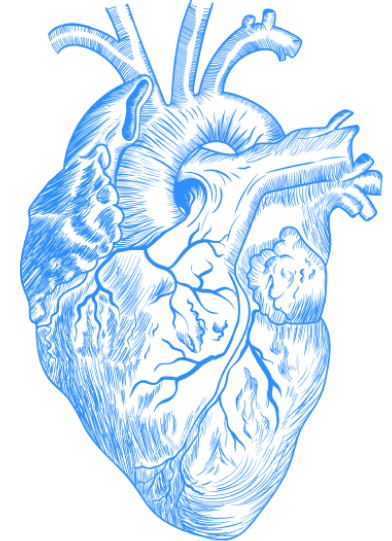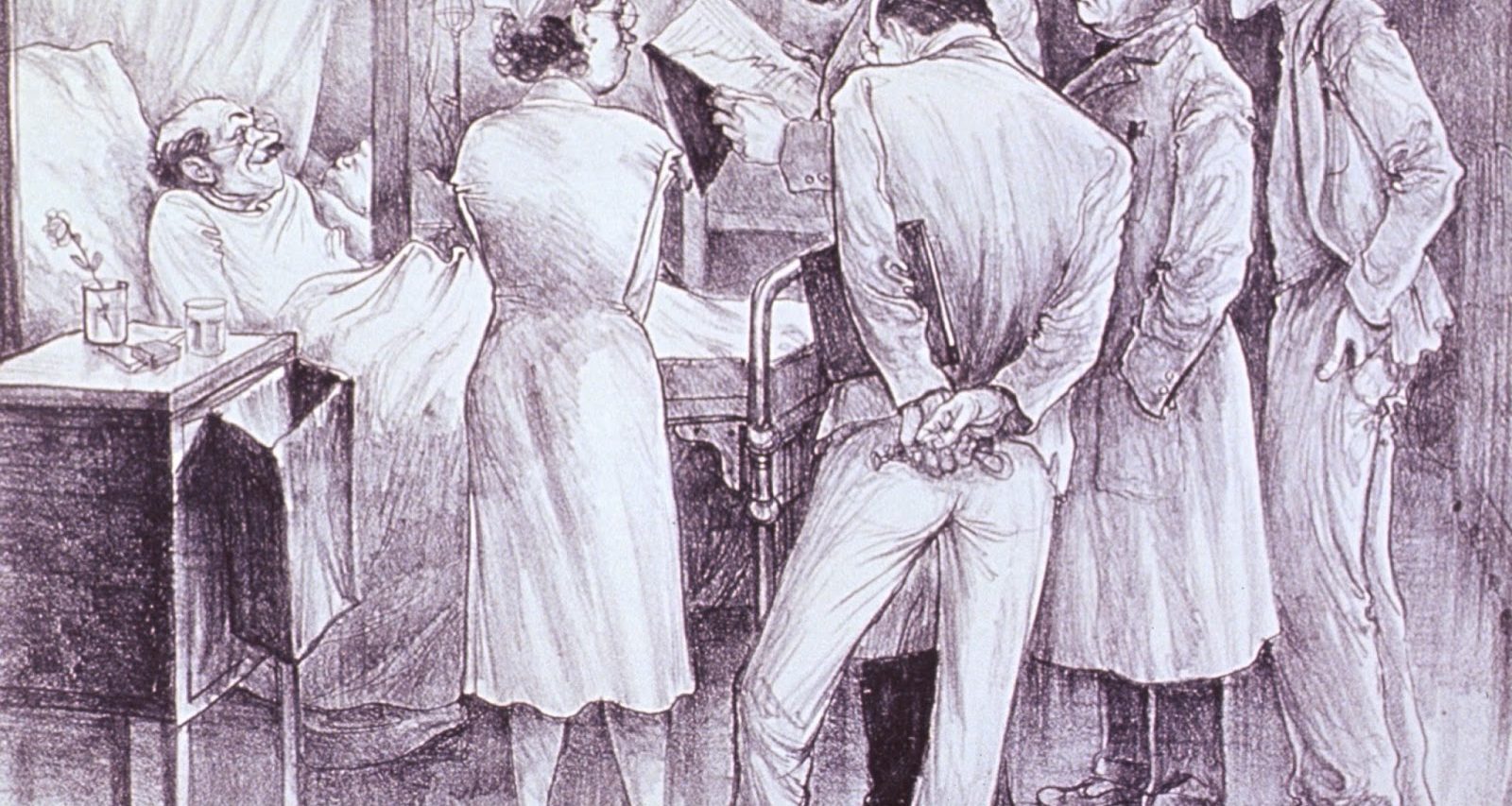
 |
| Illustration by William Sharp (National Library of Medicine) |
“What are some common causes of pancreatitis?”
The attending physician looked at me as we stood outside of the patient’s room. It was as if she had turned a stage light on over my head while medical students and residents silently waited at my flanks, watching with bated breath. I stammered and said, “alcohol.”
“And what else?”
This time the question was directed at another medical student. I breathed a sigh of relief. It was my first time experiencing what everyone in the medical field calls “pimping.”
On rounds in the hospital, attending physicians “pimp” — that is, publicly interrogate — medical students and residents about various aspects of disease and disease treatment. Physicians have practiced this method of teaching and testing for years.
Dr. Frederick Brancati popularized the term in “The Art of Pimping,” a 1989 article for the Journal of the American Medical Association that satirized the practice. He humorously (and seemingly apocryphally) tells us how the word was first used in the seventeenth century by Dr. William Harvey, the physician who discovered the circulatory system. Harvey allegedly said of his students:
They know nothing of Natural Philosophy, these pin-heads. Drunkards, sloths, their bellies filled with Mead and Ale. O that I might see them pimped!
Brancati continues with his satirical history by relating how William Osler, the father of modern medicine, used the method and its moniker in the United States. Abraham Flexner, an educational reformer and eponymous author of the Flexner Report, which detailed the failure of American medical schools to teach science properly, supposedly described Osler’s method in his diary:
Rounded with Osler today. Riddles house officers with questions. Like a Gatling gun. Welch says students call it ‘pimping.’ Delightful.
(For what it’s worth, neither the Oxford English Dictionary nor Merriam-Webster list this usage of the word. But one irked respondent to Brancati’s article offered an alternate etymology, arguing that pimping is actually a malapropism of pumping, meaning “to question persistently.” The writer insisted on correcting the record, “Lest this word, possibly used as a sensational catchword, become a neologism.”)
Pimping, though used often in the hospital, does not comprise the bulk of medical education. Prior to the third year of medical school, a student’s knowledge is tested with a plethora of multiple-choice exams. Some of these are higher-stakes than others. For example, one must pass Step 1, the first of three exams comprising the medical licensing process, in order to apply for residency, and one’s score determines where one trains.
It might seem, then, that pimping takes a back seat to such exams. But in reality they complement and build on each other. Given that Step 1 is a multiple-choice test, if you can recognize the answer then you can get the question right — you don’t have to be able to recall it from memory.
But pimping takes medical education to a different level. Not only does one have to recall the precise answer from memory when being pimped, but one has to do so in a kind of theater, in front of the whole medical team and, occasionally, the patient.
To answer these unpredictable questions correctly, one must know a great deal and demonstrate that knowledge under great stress. This is very difficult indeed. The cellular and sub-cellular aspects of human biology are dizzyingly complex. Proteins, hormones, cell membranes, hemoglobin, acids, bases, and many more players all interact with each other in different ways. The biochemical and cellular processes merge together into systems like the cardiovascular and nervous systems. One could study these systems for years and still not be comfortable with them. And they all affect each other. The kidney can compensate for a respiratory issue. The respiratory system can change because of a musculoskeletal issue. One has to understand these interactions to treat disease. Consequently, a medical education must be broad and deep.
How does one memorize or even recognize all of this information? One method involves creating mnemonics or poems. This is a perennial trick used not just by medical trainees but by religious groups as well.
In an article for Aleph, Maud Kozodoy explores this technique within the medieval Jewish tradition. Medieval Jewish scholars used poetry to memorize religious and medical facts. As Kozodoy writes, “versification facilitates memorization.” Moreover, “verse preserves the integrity of a given text or, putting the point negatively, reduces the possibility of its corruption.” Galen, the famous Greek physician of the second century AD, recognized this:
drug prescriptions in verse form are more useful than those written in prose with a view not only to memory, but also to the accuracy of the proportion in the mixture of ingredients.
Kozodoy offers another example, translating from the Hebrew a verse by Yannai, an Israelite poet circa the sixth century AD, “based on the rabbinic dictum that the 248 limbs/organs of the body correspond to the 248 positive commandments given at Mount Sinai”:
Then, two hundred and forty-eight limbs / You fashioned in man and attached to him. // You chose thirty for the soles of [his] feet / accustoming them for good and for evil. // You decreed ten for [his] feet / so that they would not slip…in the receiving of the ten commandments.
Modern medical education draws from this rich tradition of versification. Though we don’t typically memorize poems in medical school or residency, we do come up with short phrases that allow us to retain important information. Take, for example, the side effects of an anticholinergic medication like diphenhydramine (Benadryl), which blocks acetylcholine receptors in the nervous system. Most students and physicians memorize the overdose effects using the following short mnemonic:
Hot as a hare, blind as a bat, dry as a bone, red as a beet, mad as a hatter.
When you overdose on anticholinergic medications your body temperature increases, your pupils dilate, your skin dries up and flushes, and you can become delirious. We try, whenever possible, to find mnemonics like these when studying for exams, as they often make memorization easier.
Another method that helps us memorize information, though it sometimes goes unrecognized by its victims, is being the target of pimping. This makes pimping both a way to test knowledge — as in the story that opened this post — and a way to accumulate knowledge.
An attending physician once pimped me about the treatment for a pulmonary embolism, a clot that has migrated to the lungs and cut off blood supply, leading to rapid deterioration and death. One of my answers was to use nitroglycerin, a drug that causes vasodilation.
But I was very much wrong. The attending immediately said to me in front of the whole team, “you’ve just killed your patient.” Because nitroglycerin dilates vessels, it decreases the pressure of blood being pushed into the heart, and consequently decreases the force with which the blood is pushing into the pulmonary circulation and bypassing the embolism. If you do this, the body can no longer push blood past the clot, and you can die.
I will now never forget this fact. It was a stark reminder of how much more I had to learn, especially given how terrifying the consequences of my treatment would have been had I used it on a real patient.
Pimping is equal in potency to poetry and mnemonics in searing facts into one’s memory.
Recently, there has been some controversy over pimping as an educational method. Dr. Dhruv Khullar, a physician at NewYork–Presbyterian Hospital, wrote in a post for the New York Times’s Well blog that this style of teaching, in which we are only expected to demonstrate how many facts we know, “encourages us to learn to show, not grow — to project confidence, and dismiss uncertainty.” Suzanne Gordon, a medical journalist, wrote in a blog post for the British Medical Journal that pimping discourages health care providers from admitting mistakes:
If a fundamental communications skill learned in medical training is to confidently communicate knowledge that one does not actually possess, never express doubt, and avoid at all cost embarrassing a medical superior then patient safety truly becomes a mission impossible.
But this seems to miss the point. Pimping, if not done maliciously, is an effective exercise in testing and teaching. After four years of medical school and two years of residency, I still get pimped and there is still much that I do not know. Every question directed toward a student or resident is also a lesson in humility, about how much there is to learn.
What we need instead, as Dr. Khullar argues, is a shift in attitude about what it means to get something wrong.
As part of the learning process in medical school, students should be encouraged to fail, and to learn from those failures so that they better succeed as physicians. As a 2012 study in the Journal of Experimental Psychology: General demonstrated, children actually perform better in school if they are told that failure is a normal part of the learning process. They have a better working memory and are more effective in solving difficult problems.
Failure also teaches us to adapt because we remember what to do when the same situation arises again. When I face a real patient with a pulmonary embolism, I am certain I will not give that patient nitroglycerin.
There is a relatively small and brief price to pay for getting a question wrong while being pimped. But the stakes are far higher when you are the one making the decision about a real human being. And to learn from such failures as a medical student is in the best interests of both the budding physician and of his or her future patient.
Editor’s Note: This post has been updated to clarify that the poem by Yannai was not specifically written for use in medical education.
